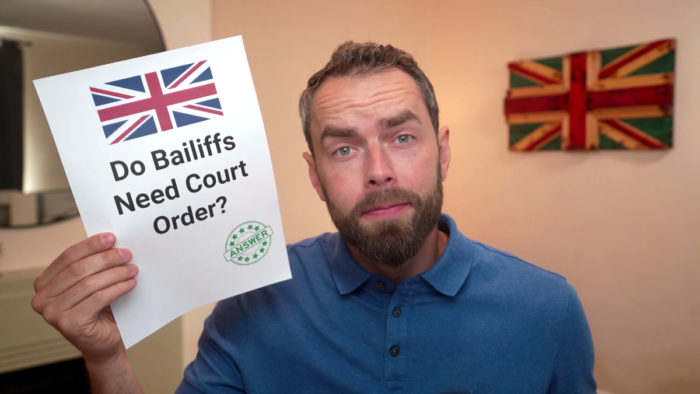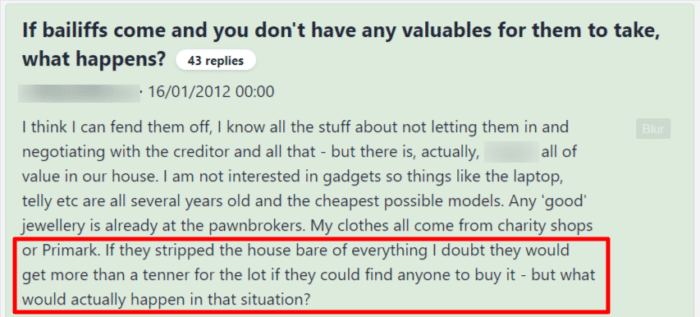Do Bailiffs Need a Court Order? – In-Depth Guide, FAQs, Tips & More
For free & impartial money advice you can visit MoneyHelper. We work with The Debt Advice Service who provide information about your options. This isn’t a full fact-find, some debt solutions may not be suitable in all circumstances, ongoing fees might apply & your credit rating may be affected.

For free & impartial money advice you can visit MoneyHelper. We work with The Debt Advice Service who provide information about your options. This isn’t a full fact-find, some debt solutions may not be suitable in all circumstances, ongoing fees might apply & your credit rating may be affected.
Are you worried about a bailiff coming to your home? Or stressed about negotiating with them? If you’re asking, ‘Do bailiffs need a court order?’ you’re in the right place. This article is made to answer your questions and ease your worries.
Every month, more than 170,000 people visit our website to learn about handling debt, as Citizens Advice estimate households have around £18.9 billion in unpaid bills like council tax and utilities1. We know that dealing with bailiffs can be tough, so we’re here to help you.
In this article, you will find:
- Clear information about court orders and bailiffs.
- Steps to take if a bailiff comes to your home.
- Tips for dealing with council tax bailiffs.
- Help for vulnerable persons dealing with bailiffs.
- Tips on how to deal with unaffordable debt.
Our team understands your worries, as some of us have been in your shoes. We know it can be stressful, but we’re here to help. Let’s dive into solving your worry about bailiffs.
Do debt collectors need one?
What exactly is it?
| Action | Fixed fee | % Extra to pay for debts over £1,500 |
|---|---|---|
| Compliance (written communication) | £75 | None |
| Enforcement (visiting your home) | £235 | 7.5% |
| Sale (removing and selling belongings) | £110 | 7.5% |
| Action | Fixed Fee | % Extra to pay for debts over £1,000 |
|---|---|---|
| Compliance (written communication) | £75 | None |
| Enforcement 1 (visiting your home) | £190 | 7.5% |
| Enforcement 2 (if they visited and you didn’t make/keep an agreement you set with them) | £495 | None |
| Sale (removing and selling belongings) | £525 | 7.5% |
» TAKE ACTION NOW: Fill out the short debt form
Do council tax bailiffs need it?
Can I Pay Them Off?
How a debt solution could help
Some debt solutions can:
- Stop nasty calls from creditors
- Freeze interest and charges
- Reduce your monthly payments
A few debt solutions can even result in writing off some of your debt.
Here’s an example:
Situation
| Monthly income | £2,504 |
| Monthly expenses | £2,345 |
| Total debt | £32,049 |
Monthly debt repayments
| Before | £587 |
| After | £158 |
£429 reduction in monthly payments
If you want to learn what debt solutions are available to you, click the button below to get started.
Can they force entry?
Can HCEOs break in?
What if you don’t have any valuables?

But for now, you need to be aware of what bailiffs can’t take.
There are strict rules on what bailiffs can’t remove from your property. These items include:
- Anything that belongs to someone else – this includes things that belong to your children
- Pets or service animals
- Vehicles, tools, or equipment that you need for your job or to study up to £1,350
- A mobility vehicle or any vehicle with a valid Blue Badge
- Anything permanently fitted to your home – kitchen units, etc.
Bailiffs also can’t take things that you need to live. These items can be anything that you use for your ‘basic domestic needs.’ They can take some of these things, but must leave you with:
- A table with enough chairs for everyone in your home
- Beds and bedding for everyone in your home
- A phone or mobile phone
- Any medicine or medical equipment that you need to care for someone
- A washing machine
- A cooker or microwave, and a fridge.
If you think that a bailiff has taken something that they shouldn’t, you need to complain immediately. I go through the complaints process below. You can also contact a debt charity for some advice. I have listed several charities that offer free advice at the bottom of this page.
Thousands have already tackled their debt
Every day our partners, The Debt Advice Service, help people find out whether they can lower their repayments and finally tackle or write off some of their debt.

Natasha
I’d recommend this firm to anyone struggling with debt – my mind has been put to rest, all is getting sorted.
Reviews shown are for The Debt Advice Service.
What fees can they charge?
How do I complain?
If you think that your HCEO has been unreasonable or behaved inappropriately, you can make a complaint. You can also make a complaint if you feel that they have broken any of the High Court Enforcement Officer Association’s (HCEOA) Code of Best Practice.
Make your first complaint to HCEO so that they have the chance to sort out the issue themselves. If you feel that they have not taken your complaint seriously enough or have not addressed your issue properly, you can escalate matters.
You can make any secondary complaint to the HCEOA. They will investigate your complaint thoroughly and provide you with a report if your complaint is upheld. If your HCEO’s behaviour was very poor, they may be fined, and you could even be owed compensation.
If your bailiff is a bailiff and not an HCEO, you can make your secondary complaints to the Civil Enforcement Authority (CIVEA). CIVEA has its own set of guidelines and procedures for dealing with complaints against its members.
How to avoid HCEOs
There are several different debt solutions available in the UK, so I recommend speaking to a debt charity as soon as possible. Their advisors will be able to look at your finances in detail and help you work out which debt solution will work best for you.
I have linked a few charities that offer these advisory services for free below.
Debt Management Plan (DMP)
A DMP is an informal debt solution that lets you pay off your debts via a single monthly payment.
Because it is informal, it is not legally binding so you are not tied into a DMP for a minimum number of payments.
Individual Voluntary Arrangement (IVA)
An IVA is a formal agreement between you and your creditors. You agree to pay a monthly sum that is distributed amongst your debts, and your creditors agree not to contact you during your IVA.
IVAs typically last for 5 or 6 years, and any outstanding debt is wiped off when it ends.
Keep in mind that IVAs are not suitable for everyone. You need to owe several thousand pounds to more than one creditor to be eligible. You also need to demonstrate that you have some disposable income every month.
Trust Deed
IVAs are not available in Scotland. Instead, you will need to opt for a Trust Deed.
Trust Deeds work in the same way as an IVA – you pay an agreed sum each month that is shared amongst your creditors, they can’t contact you, and any leftover debt at the end of your Trust Deed term is written off.
Debt Relief Order (DRO)
A DRO is a good option for those facing financial hardship with no assets and little income.
For 12 months, you make no payments, but your creditors freeze your interest and don’t contact you.
If your finances haven’t improved during this year, you may be able to write off your unsecured debts.
Bankruptcy
If you have debts but no realistic possibility of ever paying them off, you may need to declare bankruptcy.
Bankruptcy has an unfair stigma attached to it as it may be your only way of getting a financial fresh start. That said, it is a serious financial situation that should not be taken lightly.
Sequestration
Sequestration is the Scottish version of bankruptcy.
If you have little income and no valuable assets, you may be able to apply for a minimal asset process bankruptcy (MAP). A MAP is a quicker, cheaper, and more straightforward version of sequestration, so worth considering.


